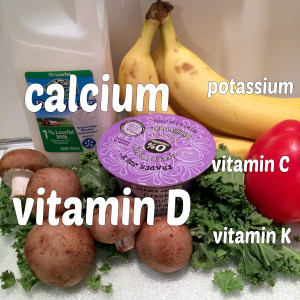Build More than Muscles – Keep Your Bones Strong
 Each May is Osteoporosis Prevention Month. Osteoporosis is a disease characterized by weak bones. Bones are live, growing tissues which must be cared for and maintained like other tissues in the body. They become weak as a result of bone loss, too little bone being made, or a combination of both.
Each May is Osteoporosis Prevention Month. Osteoporosis is a disease characterized by weak bones. Bones are live, growing tissues which must be cared for and maintained like other tissues in the body. They become weak as a result of bone loss, too little bone being made, or a combination of both.
There are some factors that may increase ones risk for osteoporosis such as being over age 50, family history, being female, and menopause. While it is common belief that osteoporosis is an inevitable part of aging, there are factors which you can control to decrease your risk of developing weak bones.
Eating and lifestyle factors play an important role in the prevention of osteoporosis. It is known that calcium is essential for bone health. This is because calcium is the major component responsible for bone strength. Calcium is also used in other systems throughout the body and it is important to take in adequate amounts of calcium each day.
When you are not consuming enough calcium, the body will take what it needs from your own body, meaning your bones. Make sure you include calcium rich foods in your regular eating habits to prevent the body from taking it out of your bones.
The best way to ensure you are getting enough calcium is through what you eat and drink. Low-fat or fat-free dairy is the most popular source of calcium. Dark leafy greens, other vegetables, almonds, and calcium fortified soy products, juices, and cereals are examples of sources of calcium in foods. These foods are part of healthful eating habits which is important for prevention osteoporosis.
Along with calcium, vitamin D is important to bone health because it helps your body absorb calcium. In tandem, these nutrients help keep bones strong and reduce the risk of developing weak bones. It is especially important to get adequate calcium and vitamin D at a young age when bones are going through their peak development, however they must be consumed as part of a healthy lifestyle at all ages.
Other nutrients for bone health include magnesium, vitamin K, potassium, and vitamin C. To ensure you are getting enough of these nutrients, make it a goal to develop well-rounded eating habits including dairy, a variety of vegetables and fruits, and fish.
Another part of prevention is engaging in physical activity which promotes bone strength, such as high impact weight bearing exercising. This includes hiking, dancing, high-impact aerobics, running, and similar activities. Low impact exercises are also beneficial and are safe for those who cannot do high impact moves or are at greater risk for breaking bones. Low impact aerobics, walking, and light weight lifting are safe alternatives that will help keep your bones strong and reduce risk of broken bones.
Don’t forget that certain eating and lifestyle factors can interfere with calcium absorption and weaken bones. Eating foods high in salt can cause your body to lose calcium and can lead to bone weakening. Similarly, caffeinated beverages such as coffee, tea, and soft drinks interfere with calcium absorption meaning you may not be absorbing as much calcium from foods as you think. Additionally, heavy alcohol consumption may cause bone loss.
Know your risk for developing weak bones and make it your mission to keep your bones strong through healthy eating and exercise. Keep meals balanced including dairy or a dairy substitute, fruits, and vegetables to get all the nutrients to maintain healthy and strong bones.
Your turn to take action: Are you doing all you can to prevent osteoporosis? Make a goal this week to make at least one change daily that will benefit your bones!


Leave a Reply
Want to join the discussion?Feel free to contribute!